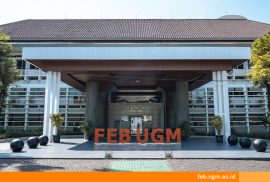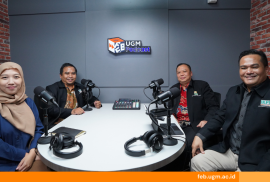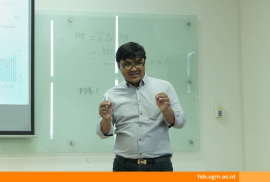Research on anthropomorphism in the business world was conducted by Lecturer of the Faculty of Economics and Business, Universitas Gadjah Mada (FEB UGM) Widya Paramita, Ph.D. , Risa Virgosita, Ph.D., Rokhima Rostiani, M.Mgt., Amin Wibowo, Ph.D., Dr. Rangga Almahendra, and Eddy Junarsin, Ph.D., entitled “I will not let you die”: The effect of anthropomorphism on entrepreneurs’ resilience during economic downturn. The article will appear in the Journal of Business Venturing Insights in late 2021.
This research was motivated by the world economy which was experiencing sluggishness during the COVID-19 pandemic. The Asian Development Bank has reported that various business sectors in various countries in the world, one of which is Indonesia, 31.2 million small and medium enterprises in Indonesia have permanently closed their businesses (Suheriadi, 2020). Whereas, entrepreneurs play an important role in the economy, as job creators, As a result, their decision to close their business will not only have an impact on themselves, but will also affect employees, customers, suppliers and other stakeholders. For this reason, according to researcher, in times of crisis, business owners need to have the resilience to maintain their business. This is the reason for researchers to examine the critical aspects that affect the determination of entrepreneurs to maintain their business, or what is called entrepreneurial toughness.
The study of the entrepreneurial literature has discussed the phenomenon of anthropomorphism that can increase the emotional closeness of business owners to their businesses. This article describes an empirical study that examines the influence of anthropomorphism, which is a phenomenon where business owners perceive their business as a living being or child, with entrepreneurial toughness.
Data and sample collection was carried out using the context of Indonesian entrepreneurs, particularly small and medium-sized enterprises, which have been heavily affected by the recent economic downturn due to COVID-19. According to the researcher, despite their significant contribution to the country’s GDP, Indonesian entrepreneurs receive almost no financial support from the government due to slow administrative problems. Because they lack external support, the researcher expects anthropomorphism to have an influence on entrepreneur resilience.
The research method is carried out by an online survey of business owners in Indonesia, this study tests three main hypotheses: (1) Anthropomorphism has a positive effect on entrepreneurial resilience; (2) The relationship between anthropomorphism and entrepreneurial resilience is explained through entrepreneurs’ perceptions of their business reputation; (3) The indirect relationship between anthropomorphism and entrepreneurial resilience only applies to businesses that are not family businesses and does not apply to family businesses.
The results of the analysis support the three main hypotheses in the study. Namely, anthropomorphism can increase the resilience of business owners in times of crisis because they think that their business has a positive reputation so that it is worth keeping. Like parents who always view their children positively. However, this relationship cannot be predicted in family-owned businesses, because varying family dynamics reduce the ability of anthropomorphisms to predict entrepreneurial resilience.
Researchers conclude that the anthropomorphism of entrepreneurs towards their business leads to resilience. Thus, anthropomorphism makes entrepreneurs evaluate their business more positively and feel a better business reputation. However, the relationship between anthropomorphism and resilience is validated only if the business is not a family or private business and invalid if the business is a family business. Therefore, social marketing efforts are needed aimed at entrepreneurs using an anthropomorphism approach, namely by encouraging the thought that their business is a “child” that must be fought for.
—
Author of the paper: Widya Paramita, Risa Virgosita, Rokhima Rostiani, Amin Wibowo, Rangga Almahendra, dan Eddy Junarsin.
Published on Journal of Business Venturing Insights, Volume 17, June 2022, e00300
Link: https://www.sciencedirect.com/science/article/pii/S2352673421000780




